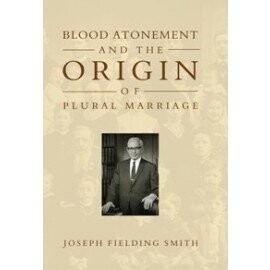0
New Books
Biographies
Children
Faith-Promoting Series
Government
History
Home School
LDS Doctrine
Non-LDS
Scripture & Apocrypha
Self-Improvement
Youth
Blood Atonement and Origin of Plural Marriage (1905)
$12.95
In stock
Product Details
During the first decade of the 20th century, following the Jackson County Temple Lot Suit, missionary activity in Utah by the Reorganized Church of Jesus Christ of Latter-day Saints was strong.
In order to quell RLDS charges against the Utah Saints, the young, soon-to-be Apostle and Church Historian, Joseph Fielding Smith, maintained a dialog with the 2nd Counselor of the RLDS First Presidency, Richard C. Evans. This book is a compilation of the correspondence between the church leaders concerning certain points of doctrine as well as the right to lead the Church following the martyrdom of Joseph Smith. Other books published to refute RLDS claims to the right of succession during this period were THE ORIGIN OF THE "REORGANIZED" CHURCH (1909) by Joseph Fielding Smith, and A KEY TO SUCCESSION IN THE PRESIDENCY OF THE CHURCH (1909) by P. J. Sanders. 94 pages.
Reviewed by Colby Townsend for the Association for Mormon Letters: You would be hard pressed to find a member of the Church of the Jesus Christ of Latter-day Saints [1] who does not know about Joseph F. Smith, Jr., or more commonly known today as President Joseph Fielding Smith. It is much harder to find a member of the Church who knows anything about the early history of President Smith, though, and luckily this Archive Publishers' reprint will help rectify this problem. Known for his many writings, speeches, and staunch insistence for more orthodox and collective views on Mormon thought, belief, and practice, Pres. Smith shows openly his forceful desires to make obvious and prove that the Church is the correct church, and that there can be no more "Reorganizations" [2] of Jesus' Church after the restoration of the Church through Joseph Smith in 1830. Not only this, but Joseph Fielding Smith will do much work, alongside other Mormon historians of this period, to provide affidavits and other material essential for what we understand about the early origins of polygamy. This struggle is taken up in this book through a series of three open letters written between Pres. Smith and a Mr. Richard C. Evans, second counselor in the First Presidency of the Reorganized Church in 1905. They will both provide evidence for each side, whether or not the origin of polygamy was with Joseph Smith. This version of the story is given on the side of Joseph Fielding Smith, but it does appear that he has provided all of the pertinent information, something he charges his opponent of not being faithful to. [3] The story begins with an interview from the Toronto, Canada Daily Star, printed Jan. 28, 1905. Joseph Fielding Smith claims that Mr. Evans has "wilful[ly] misrepresent[ed] ... the doctrines of the Latter-day Saints and [has shared an] unwarranted abuse of the authorities of the Church..." [4] Smith then responded to Mr. Evans with an open letter that was published in the same newspaper on the 25th of February, less than a month after the first interview was published. In response to this open letter, Mr. Evans published an article in the RLDS newspaper, Zion's Ensign, where he stated that "good will be accomplished by the publication of the entire matter," [5] where, as Smith points out, one is led to believe that Mr. Evans has published the entire letter, but it becomes apparent that Mr. Evans had edited out those things which were damaging to his side of the argument. The first six pages of introduction are spent on this point by Smith, and he goes to great lengths discussing the implications of each of those parts left out. The next section is the reprinted interview of Mr. Evans with the Toronto Daily Star. Mr. Evans had just arrived at Toronto and had held services with a local congregation. He told of how he had met four Utah Elders and three women who were with them and how they all had a discussion about polygamy. They of course defended the belief, even to the point of saying that the United States would be punished by God for prohibiting it. [6] For this reason he decided to hold a series of addresses in Toronto exposing polygamy and blood atonement. He recounts the history of his church, beginning at Joseph Smith and ending with the then president Joseph Smith III. He described how the Church was "reorganized" by Brigham Young after the death of Joseph Smith, a point which Smith takes issue with, arguing that the Church was never disorganized, only the first presidency, at the death of Joseph Smith. Smith then provides nine pages of response to Mr. Evans' three and a quarter page interview. This evidences Smith's strong desire to cover all the bases and engage in a full discussion with Mr. Evans. He touches on the use of the appellation "Mormon" and how Mr. Evans did not like that to be used for members of the RLDS faith; Mr. Evans' discussion and renunciation of blood atonement without reviewing the relevant texts; [7] and the misuse of history in his discussion of polygamy. Evans responds with a similar approach as Smith's. He calls out Smith for "misrepresent[ing] the interview... [and] the true facts regarding 'blood atonement,' 'polygamy,' etc., and [his] faith in the Book of Mormon." [8] He also touches on the use of the term "Mormon" and the fact that the "Church never has adopted the name 'Mormon' as being the proper name of the church." He goes on to discuss blood atonement, saying that "the doctrine of the atonement of Christ is far above the doctrine of blood atonement as taught by Brighamism..." [9] He then quotes multiple speeches made by Brigham Young, Orson Hyde, and others on the topic of blood atonement. Smith and Evans continue on in this vein, both responding to the last statements of the other and providing new or important evidence for their claims. The main thrust of each side is whether or not one can affirm that polygamy began with Joseph Smith or with Brigham Young, and both providing convincing arguments within their own framework. The passing of history has shown that polygamy most definitely began with Joseph Smith, sometime in the mid-1830's. The affidavits provided by Smith in this book (pp. 67-88) and other evidence have provided strong ground to be able to discuss and comment on the history behind the practice of polygamy beginning with Joseph Smith, and leading up to FLDS groups extant today. For a student of Mormon and Western American history, this book is a must have. Archive Publishers has produced a great paperback reprint at an affordable cost so that anyone can have a copy of this book and see through a window into the debate between the LDS and RLDS groups on polygamy at the beginning of the twentieth century. Footnotes: [1] The reader will note that I will use "Church" for the LDS organization, and "church" for the RLDS and other organizations in certain parts of this review. This is not meant to demean the RLDS church or lift up the LDS, but rather for simplicity. [2] Note his use of quotation marks when speaking of the then RLDS church on page 3. [3] Joseph Fielding Smith, Blood Atonement and the Origin of Plural Marriage (Salt Lake City: Deseret News Press, 1905), 4. [4] Smith, Blood Atonement, 3. [5] Smith, Blood Atonement, 4. [6] Smith, Blood Atonement, 7. [7] The texts that Smith discusses all have to do with the importance of Jesus' atonement and blood sacrifice. See Smith, Blood Atonement, 12-15.. [8] Smith, Blood Atonement, 20. [9] Smith, Blood Atonement, 22.
| ISBN | 9781930679276 |
|---|---|
| Author | Joseph Fielding Smith |
| Age Group | 16+ |
| Book Type | paperback |
Save this product for later
Blood Atonement and Origin of Plural Marriage (1905)
Display prices in:
USD

